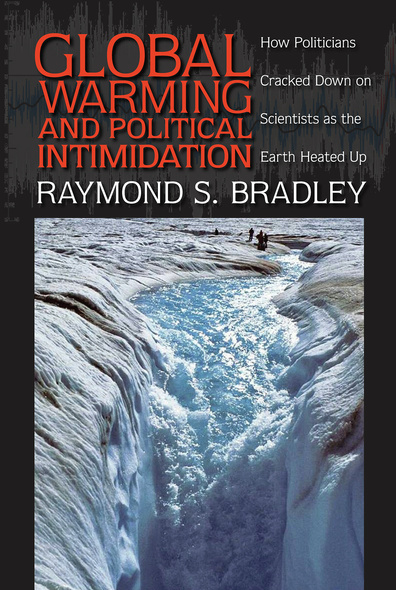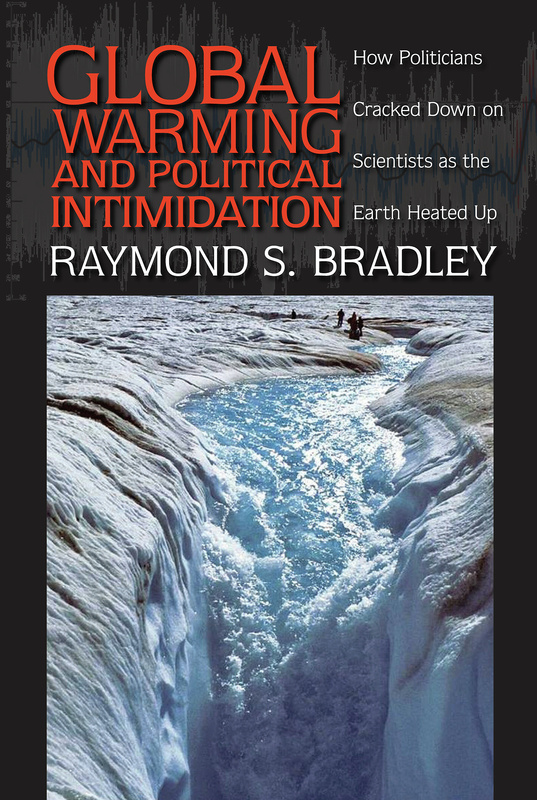Global Warming and Political Intimidation
How Politicians Cracked Down on Scientists as the Earth Heated Up
University of Massachusetts Press
Global warming is the number one environmental issue of our time, yet some prominent politicians have refused to accept scientific evidence of human responsibility and have opposed any legislation or international agreement that would limit greenhouse gas emissions. A few have gone even further and have tried to destroy the reputations of scientists researching climate change by deliberately undermining the credibility of their research. These politicians have sought to sow seeds of doubt in the minds of the public and to weaken public and political support for the control of fossil fuel use.
In this powerful book, highly respected climate scientist Raymond Bradley provides the inside story from the front lines of the debate. In clear and direct language, he describes the tactics those in power have used to intimidate him and his colleagues part of a larger pattern of governmental suppression of scientific information, politics at the expense of empirically based discourse.
Speaking from his experience, Bradley exposes the fault lines in the global warming debate, while providing a concise primer on climate change. The result is a cautionary tale of how politics and science can become fatally intertwined.
In this powerful book, highly respected climate scientist Raymond Bradley provides the inside story from the front lines of the debate. In clear and direct language, he describes the tactics those in power have used to intimidate him and his colleagues part of a larger pattern of governmental suppression of scientific information, politics at the expense of empirically based discourse.
Speaking from his experience, Bradley exposes the fault lines in the global warming debate, while providing a concise primer on climate change. The result is a cautionary tale of how politics and science can become fatally intertwined.
At a time when scientists need to become better advocates for the integrity of science itself, it is heartening to read this clear-headed and compelling account from Raymond Bradley. Anyone interested in the politics and science of global warming should read this book.'—Chris Mooney, author of Unscientific America: How Scientific Illiteracy Threatens Our Future
'Ray Bradley did what every young scientist dreams of: made a major technical contribution to science that really mattered to the world. With colleagues Michael Mann and Malcolm Hughes, Bradley built the 'hockey stick,' the statistical analysis that showed that recent warming is outside the range of historic natural variability His reward for this was not the National Medal of Science, but harassment by members of the United States Congress. Bradley writes that he remains optimistic that a solution to global warming can be found, but given the story he tells in this book, it's hard to see why.'—Naomi Oreskes, coauthor of Merchants of Doubt: How a Handful of Scientists Obscured the Truth on Issues from Tobacco Smoke to Global Warming
'Ray Bradley is one of the scientific heroes of the fight to slow global warming—and so, like many other researchers, he's taken endless lumps from the industry-funded pols trying desperately to delay action. His story is both fascinating and cautionary—about not just our planetary climate, but our political one as well.'—Bill McKibben, author of Earth: Making a Life on a Tough New Planet
'Bradley's book describes how scientists who attempt to understand global climate dynamics have been intimidated and harassed by the denial machine. Bradley is one of the authors of the famous 'hockey stick,' a graph in the Intergovernmental Panel on Climate Change reports that clearly shows the sudden uptick in global average temperatures beginning in the twentieth century. Because the graph is so clear and dramatic, it has been the subject of sustained and arcane attacks by the climate denial machine. Bradley's book provides an enlightening look at this controversy, which turned obscure technical details like principal component analysis and archived Gaspé tree ring data into the stuff of high drama.'—Natural Hazards Observer
'Bradley details the chilling effect [political] investigations have had on the conduct of science and how politicians have become nonexpert reviewers of science.'—Science News
'[Raymond Bradley] tells the inside story of what he says it was like to be the target of intimidation in the last decade by powerful figures in politics and government who tried hard to suppress scientific findings on global warming in favor of their own political message.'—The Sentinel
'Bradley's book is a valuable insight into the harrying that many climate scientists have had to endure over the past two decades. It lets us see what it is like to be on the receiving end of political intimidation and ranting deniers in the media and blogosphere...Bradley uses the word malevolent only once, and evil not at all, but both words came to my mind frequently.'—Bryan Walker, Celsias
'Along with his sharp words for his climate detractors, Bradley also voices his sharp ideas and bright hopes that society still might 'at least try to find a path that limits the worst case scenarios.''—The Yale Forum on Climate Change the Media
'In about 360 pages, Bradley has written an essential guide to the issues and problems faced due to global warming in the United States and the world, issues that already have affected every person on earth. . . . This book is not directly a call to arms; however, any reader interested in the now unstoppable effects of global warming may be inspired to take some action beyond merely reading about it.'—Frank E. Grant, Sierra Club West Virginia
'Bradley's book describes the shock of being yanked out of the scholarly realm and into the arena of partisan politics.'—The Boston Globe
'Bradley's book offers candid detail about subjective factors in scientific publications as well as congressional hearings. Recommended.'—Choice
'Tactics used by those in power to suppress scientific information make for pointed chapters that both expose the global worming issues and the underlying politics affecting information development.'—Midwest Review
'Government officials used the political system to tie-up Bradley's research for several years and to belittle the consequences of global warming, dangers, the author carefully describes.'—ForeSight Politics
'Bradley's argument also reaches beyond global warming, addressing fundamental concerns about scientific integrity and academic freedom. Can this ill-conceived politicization of science lead us to a strengthening of safeguards—especially in the face of declining tenure rates and the associated loss of academic freedom protections? Will colleges and universities continue to uphold their commitment to support scholars who challenge powerful interests? Bradley's news on this front is encouraging.'—AAUP
'Climatologist Raymond Bradley has come out fighting in his new short book Global Warming and Political Intimidation. It's a lively albeit sobering narrative which recounts his and others' experience of harassment, character assassination and unfounded accusation from the politicians who serve fossil fuel interests in the US Congress. . . . Bradley's book is a valuable insight into the harrying that many climate scientists have had to endure over the past two decades.'—Cleantechies.com
RAYMOND S. BRADLEY is University Distinguished Professor in the Department of Geosciences and director of the Climate System Research Center at the University of Massachusetts Amherst. He is author of Paleoclimatology: Reconstructing Climates of the Quaternary, described by Quaternary Science Reviews as "an indispensable work of reference for scientists and students alike."





